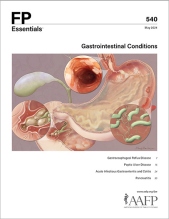
This clinical content conforms to AAFP criteria for CME.
Gastroesophageal reflux disease (GERD) affects more than 20% of adults. Risk factors include older age, obesity, smoking, and sedentary lifestyle. Lower esophageal sphincter (LES) dysfunction is a primary cause. Classic symptoms include heartburn and regurgitation. With classic symptoms, proton pump inhibitors (PPIs) can be prescribed without further testing; PPIs should be taken on an empty stomach. Patients with atypical symptoms and those not benefiting from management should undergo esophagogastroduodenoscopy (EGD), and potentially pH and impedance testing to confirm GERD or identify other conditions. This is important because GERD increases risk of esophageal erosions/stricture, Barrett esophagus, and esophageal adenocarcinoma. However, a large percentage of adults taking PPIs have no clear indication for treatment, and PPIs and other antisecretory therapy should be tapered off if possible. Of note, vonoprazan, a new drug approved by the Food and Drug Administration (FDA), has shown superiority to PPIs. In addition to pharmacotherapy, lifestyle changes are indicated, including losing weight if overweight, not lying down after meals, and ceasing tobacco use. Procedural interventions, including fundoplication and magnetic sphincter augmentation, can be considered for patients wishing to discontinue drugs or with symptoms unresponsive to PPIs. Procedural interventions are effective for the first 1 to 3 years, but effectiveness decreases over time.
Case 1. JV is a 56-year-old patient who comes to your office because of intermittent burning chest discomfort. He has obesity and hypertension, smokes one-half pack/day of cigarettes, and drinks 5 to 7 drinks/week of alcohol. He has been evaluated for the discomfort several times over the past year in urgent care and emergency departments. Each time, JV was discharged home after evaluation found no evidence of cardiac problems, with recommendations to take over-the-counter drugs for heartburn management. He takes a proton pump inhibitor (PPI) after he feels symptoms, but he says they have not really helped.
Subscribe
From $350- Immediate, unlimited access to FP Essentials content
- 60 CME credits/year
- AAFP app access
- Print delivery available
Edition Access
$44- Immediate, unlimited access to this edition's content
- 5 CME credits
- AAFP app access
- Print delivery available
